During the 2024 election campaign, all parties confirmed they supported an Occupied Territories Bill in some form. However, post-election, campaigners are concerned legislation is being watered down. So how did it get to this and can a bill progress?
The original Occupied Territories Bill was first tabled by Senator Frances Black in 2018.
Under the legislation, the importation or sale of goods and services from Occupied Territories would be a criminal offence with a fine of up to €250,000 and a five-year jail term.
It proposed banning trade from any occupied territories in the world but was generally expected to be amended to just the territories occupied by Israel.
Around 700,000 Israeli settlers live in 160 settlements in the West Bank and East Jerusalem - 7% of Israel's population.
Currently, there are no Israeli settlers in Gaza, so any bill would not apply there.
The Bill passed through the Seanad and the first two stages in the Dáil. Its progress stalled in recent years until a key development at the International Court of Justice (ICJ), the UN's highest court, in July 2024.
An adjudication of the ICJ found Israel’s "continued presence in the Occupied Palestinian Territory is illegal," adding crucially, that member states are obliged "to take steps to prevent trade or investment relations that assist in the maintenance of the illegal situation created by Israel."
The decision was a "gamechanger", according to one of the drafters of the Bill, Conor O’Neill of Christian Aid Ireland.
Mr O’Neill and other campaigners viewed the development as providing legal cover, and an imperative, for the bill to progress.
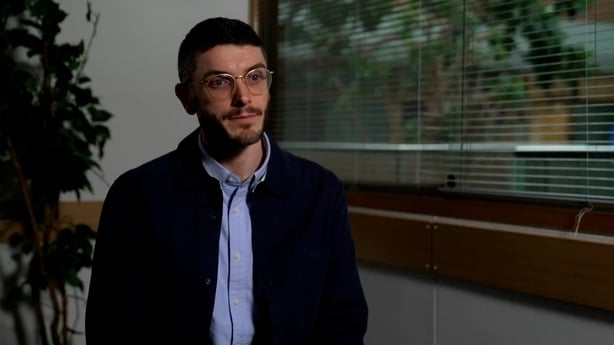
The political establishment appeared to agree. All parties prior to the last general election confirmed they supported an Occupied Territories Bill, with Fianna Fáil committing to progressing the original Bill with amendments.
The new Government's position is that there are major legal issues needing substantive work.
A spokesperson for Tánaiste, Simon Harris told Prime Time, "it is important that we allow time for this work to take place in an appropriate manner. The Tánaiste intends to engage with Senator Black."
Government is continuing to, "prioritise concrete policies and actions that contribute to improving the situation on the ground," the spokesperson added, pointing to need for progress on hostage release and the delivery of aid to Gaza.
Ireland recently pledged €20 million in support for the UN Relief and Works Agency (UNRWA) for its humanitarian work.
Services not included
Proponents of the Bill have suggested that it is being watered down. Suspicions heightened by confirmation last week that services would not be included in forthcoming legislation.
Questioned by Sinn Féin’s Donnchadh O'Laoghaire, the Tánaiste told the Dáil, "I am saying that at the moment our focus is on progressing legislation to prohibit goods."
Technical and legal amendments needed to strengthen the Bill are being used as a "smoke screen" for a political decision on the inclusion of services, Conor O'Neill suggested, arguing that 70% of the trade with the Occupied Territories is in services.

Excluding services would mean tech and finance companies would not be impacted by a boycott. Short-term rental platforms like Airbnb that advertise holiday lets in the West Bank would be unaffected.
Airbnb announced in 2018 that it would stop hosting listings in the area but reversed the decision following legal challenges from hosts. Airbnb told Prime Time that since then it has donated all profits from listings in the West Bank to humanitarian organisations.
"Airbnb has never boycotted Israel, Israeli businesses, or the more than 20,000 Israeli hosts who are active on the Airbnb platform," the company said, declining to comment directly on the Occupied Territories Bill.
"We have always sought to bring people together and will continue to work with our community to achieve this goal."
In total the UN has said there are almost 100 companies with business ties to Israeli settlements.
A fear over the impact on Airbnb and other US companies' Irish operations as a result of a trade ban is "greatly exaggerated, sometimes for political purposes," Mr O’Neill told Prime Time.
Historical parallels
There are historic parallels in Ireland going back decades to when Dunnes Stores checkout workers refused to handle South African goods in protest of apartheid.
Speaking to RTÉ in the summer of 1984, Karen Gearon urged the Government to go further than their pronouncements against South African apartheid and to "do something".
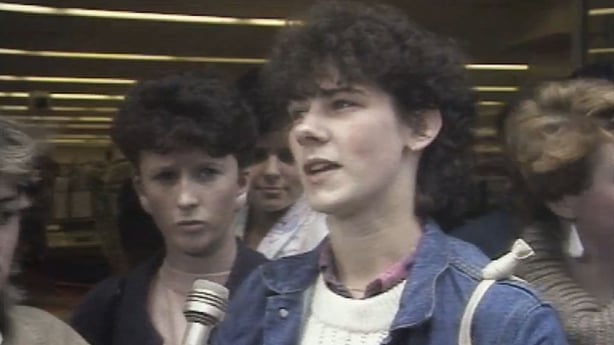
More than 40 years later, Ms Gearon is applying a similar principle to the Occupied Territories Bill.
Ms Gearon, who has campaigned in support of the legislation, told Prime Time that it "sends a similar message to the one we sent to South Africa."
"We can't condone what Israel is doing in the West Bank. You cannot have any country that is so far superior in funding, in money, in war machines, in bombs, literally annihilating another people."
It's less well remembered that the Dunnes strike didn’t lead to an overnight change in policy; it took almost three years for the movement to succeed. But the outcome, ultimately, was far reaching, making Ireland the first Western nation to ban apartheid goods.
"We forced and embarrassed the Irish Government into implementing a total ban on South African goods," Ms Gearon said.
There is the same imperative to take a stand in response to the actions of the Israeli state, she believes.
US pressure
Last week, Israel’s Prime Minister Benjamin Netanyahu became the first foreign leader to visit the Oval Office and declared that President Trump was, "the greatest friend Israel has ever had in the White House."
Beyond the President’s own suggestion of redeveloping Gaza as a coastal resort, his choice for ambassador to Israel Mike Huckabee has denied that the country is occupying Palestinian territories.
"There's no such thing as a settlement. They're neighbourhoods. There's no such thing as an occupation," he said in 2017.
Trump’s pick for UN ambassador, Elise Stefanik, has said she believes Israel has a biblical right to the entire West Bank.
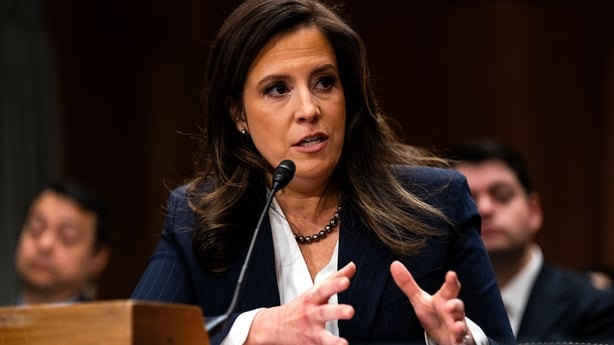
US support for Israel long predates the current president. A group of ten US congressmen wrote to then Taoiseach, Leo Varadkar, in 2019 urging him to drop the Occupied Territories Bill.
Already 38 states have passed anti-boycott legislation which means state governments won’t do business or invest with companies involved in boycotting Israel.
StandWithUs, a US non-profit group "with a dual mission of educating about Israel and combating anti-Semitism," has been involved in campaigning for anti-boycott laws.
"Most of these states have recognised that the Boycott, Divest, Sanctions (BDS) movement is an international campaign to undermine the economic stability of the Jewish state of Israel," Carly Gammill, Legal Department Director at StandWithUs told Prime Time.
She said the Occupied Territories Bill, "would put a number of companies in a very difficult position of having to decide whether they are going to adhere to US law, or because they have operations in Ireland, they are going to be at odds with Irish law."
"It's a criminal offence to engage in the types of activities that the (Irish) law prevents. I think it would be a fairly serious situation for those companies."
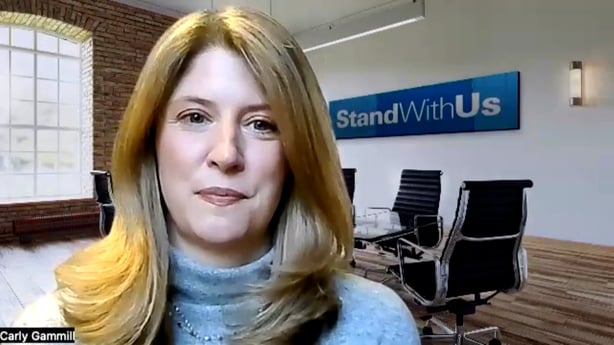
The US legislation is designed to prevent a complete boycott of all of Israel, and would not, according to Christian Aid’s Conor O’Neill, be relevant to the Irish bill as it is limited to the Occupied Territories which are not considered part of Israel under international law.
Ireland and Spain have pushed for the EU to review its overall trade agreement with Israel, in response to human rights abuses during its campaign in Gaza.
However, such a decision would need to be backed by all member states, which is considered unlikely.
Those behind the Occupied Territories Bill believe passing the Bill could have a reach beyond our shores.
The Bill would lead to an inevitable legal challenge in Europe which, if won by Ireland, would provide a precedent for other EU countries to act, they contend.
However, critics of Israeli boycotts say the BDS movement hinders collaboration and peacemaking efforts. Israel has argued that the territories in Palestine are disputed rather than occupied. Jews do not believe they are settler colonists and claim a 3,000 year continuous history of indigeneity.
Rejecting the imperative for a boycott bill, Carly Gammill suggested Israel has not demonstrated a desire to perpetually occupy any particular territory and numerous times has been willing to accept a two-state solution which has not been accepted by Palestinians.
The International Court of Justice, the UN General Assembly and the UN Security Council all regard Israel as the occupying power for the territories but that categorisation is an oversimplification of a complex situation, Ms Gammill said.
"You can't divorce the decisions that are all related to the United Nations from the reality that the United Nations is decidedly anti-Israel," she said.
Dr Dana Barnett, Director of the Israel Academia Monitor, told Prime Time that Ireland was "mad" to attempt to consider introducing a boycott bill.
She suggested Israel's actions are in defence against Hamas attacks and part of a wider hostility to Israel from "radical Islam".
"The UN has been very hostile to Israel but I would have expected the Irish people to have more common sense."
Suggesting that Israeli settlements can be an economic benefit to Palestinians, Dr Barnett said preventing Jews from living in the West Bank, which Israeli's refer to as Judea and Samaria, would be a form of apartheid.
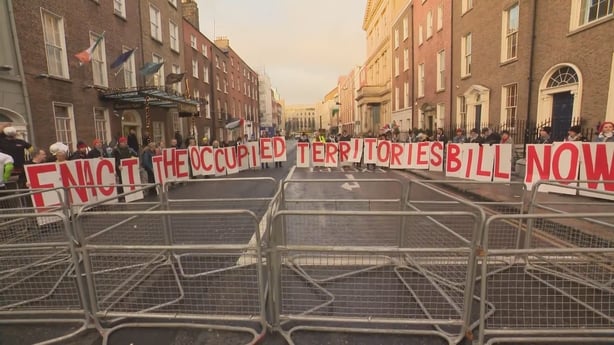
But Dunnes Striker Karen Gearon categorically rejects any suggestion of antisemitism.
"When you're being named as antisemitic you are saying that you are against a particular religion. I'm not against any religion. People have a right to believe in whatever they believe but not at the cost of another person's life."
"We have to stand on the side of doing the right thing. We cannot let a people be just wiped off a planet."
The International Criminal Court has accused Benjamin Netanyahu and former Defence Minister Yoav Gallant of causing starvation and deliberately targeting civilians. However, Dr Barnett argued that such crimes were undertaken by Hamas.
"The fact that Israel is a democratic state and you [Ireland] are supporting a non-democratic element is horrible for you. It is a hypocritical view to blame Israel for the fact that Hamas is actually harming its own people."
Ireland was aligning with terrorists in supporting an Occupied Territories Bill, she added, suggesting that there would be "repercussions".
"I doubt that America would let it happen without saying anything. So you'll be slapped back."
For proponents of the Bill, like Conor O’Neill, a boycott of trade with Israeli settlements is an opportunity for Ireland to redouble our commitments to the rule of law.
"If we allow ourselves to slip back into a position where might is right… what's going to happen is not just the betrayal of Palestinians but the dismantling of international law itself."
While Ireland respects and relies on such a system, Mr O’Neill argued "it's not enough to say it, you have to defend it."
The parallels between the Dunnes strike and concerns over the potential economic impact of an Occupied Territories Bill are not lost on Karen Gearon, who described how the blacklisting and loss of earnings she experienced during the lengthy protest was worth it, "because we helped to change something fundamentally wrong."
"You can't violate a people, and the world can't stand by and let that happen. Ireland needs to take a stand, as it has done on many fronts in the past."
Reporter Louise Byrne and producer Aaron Heffernan’s report on the Occupied Territories Bill broadcasts on the 18 February edition of Prime Time on RTÉ One and RTÉ Player.







